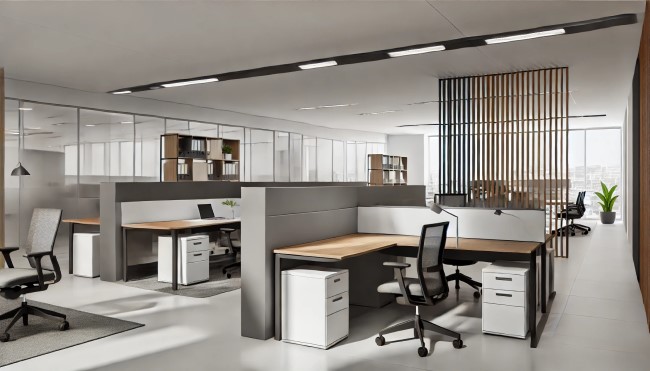Terry Block Office Furniture: Revolutionizing Workspace Design

In the fast-paced business world, the design of office spaces plays a critical role in productivity, collaboration, and overall employee satisfaction. Terry Block, a seasoned architect and expert in modular building systems, has brought significant innovations to office furniture design, making him a leader in the field. In this article, we delve into Terry Block’s contributions to office furniture, modular systems, and the future of workspace environments.
The Visionary Behind Terry Block Office Furniture
Terry Block, President of Personal Spaces Inc., has over 35 years of experience providing planning and design services to major corporations. His company, PSI Modular Buildings & Systems, specializes in modular office buildings, offering flexible solutions that redefine traditional office spaces. Terry’s background as a registered architect enables him to create furniture systems that are not only aesthetically pleasing but also highly functional.
What Sets Terry Block’s Office Furniture Apart?
Terry Block’s approach to office furniture is centered around the concept of flexibility and sustainability. PSI’s modular buildings are designed to be fully reusable, offering companies a cost-effective solution that can be adjusted as their needs evolve. These units are classified as equipment rather than permanent structures, making them easier to depreciate and replace as necessary.
1. Modular Furniture Systems
At the heart of Terry Block’s design philosophy is modularity. The modular systems offered by PSI are easy to assemble, disassemble, and move, making them perfect for dynamic office environments. From 80 to 8,000 square feet, these systems can be installed in a matter of days or weeks, minimizing downtime for businesses.
2. A-Wall Building Systems & Allied Modular Building Systems
Terry Block is known for featuring A-Wall Building Systems and Allied Modular Building Systems. These systems are flexible enough to create one or two-story enclosures, ensuring that office environments are tailored to the specific needs of the business. Whether a company needs a small meeting room or a multi-story office, Terry Block’s modular systems provide a sustainable and adaptable solution.
3. Depreciation as Equipment
Unlike traditional office buildings, PSI’s modular systems are considered equipment. This classification has financial advantages, as companies can depreciate these units faster and even write them off in the year of purchase. For businesses looking for quick returns on investment, this financial flexibility is a game-changer.
The Impact of Modular Furniture on Office Productivity
The design of office spaces has evolved dramatically over the years. In today’s fast-paced world, businesses need furniture that adapts to change and fosters productivity. Terry Block’s office furniture and modular systems excel in this regard.
1. Adaptability and Flexibility
As companies grow or restructure, their office needs may change. Terry Block’s modular systems allow for this flexibility. Furniture can be easily reconfigured, new sections can be added, and old ones can be removed without major disruptions. This adaptability enables companies to respond swiftly to changes in team sizes, work processes, or client demands.
2. Improved Collaboration
The open floor plans enabled by modular office furniture promote better communication among team members. Terry Block’s systems are designed to create spaces that foster collaboration. Companies that use these modular systems report improved teamwork, as employees have more opportunities to engage with each other in shared spaces.
3. Cost-Effective Solutions
Building a traditional office can be a costly and time-consuming endeavor. Modular furniture systems, however, offer a more cost-effective alternative. Terry Block’s solutions can be installed in a fraction of the time, and they often cost less than permanent structures. This makes them an attractive option for startups and growing businesses.
Environmental Sustainability and Modular Office Furniture
As companies become more environmentally conscious, there is an increasing demand for sustainable office solutions. Terry Block’s office furniture systems are not only flexible but also sustainable, addressing this growing concern.
1. Reusable Materials
One of the key features of Terry Block’s modular systems is their reusability. These systems are designed to be demountable, meaning they can be easily taken apart and reused in other projects. This reduces the need for new materials and minimizes waste, making Terry Block’s designs an eco-friendly choice for businesses looking to reduce their carbon footprint.
2. Energy Efficiency
Modular buildings and furniture systems are often more energy-efficient than traditional office structures. The materials used in these systems are chosen for their insulating properties, helping to reduce heating and cooling costs. Additionally, since these systems can be installed quickly, companies can reduce the energy consumption associated with lengthy construction projects.
3. Sustainable Design
Terry Block’s commitment to sustainable design is evident in the way he approaches each project. His modular systems can be customized to include energy-efficient lighting, natural ventilation, and other features that reduce energy consumption. By integrating sustainability into his designs, Terry Block helps businesses reduce their environmental impact while still creating functional and attractive workspaces.
The Future of Office Furniture: Insights from Terry Block
As remote work and flexible schedules become more common, the demand for adaptable office furniture systems is expected to grow. Terry Block’s modular furniture systems are well-positioned to meet this demand, offering companies a way to create office environments that can be easily modified as their needs change.
1. Hybrid Work Environments
In the post-pandemic world, many companies are adopting hybrid work models, where employees split their time between working from home and the office. Terry Block’s modular systems can help companies create spaces that accommodate this new way of working. For example, modular walls can be used to create quiet spaces for remote meetings, while open areas can be designed for collaborative work when employees are in the office.
2. Customization and Personalization
As companies look for ways to stand out in a competitive market, the ability to customize office furniture is becoming increasingly important. Terry Block’s systems are highly customizable, allowing businesses to create spaces that reflect their brand identity. From color schemes to layout designs, every aspect of the office can be tailored to meet the specific needs of the company.
3. Technology Integration
The integration of technology into office furniture is another trend that Terry Block is capitalizing on. Modular furniture systems can be designed to incorporate charging stations, smart lighting, and other tech features that enhance productivity. By staying at the forefront of technological advancements, Terry Block ensures that his office furniture systems remain relevant in the ever-changing business landscape.
Conclusion
Terry Block has revolutionized the office furniture industry with his innovative modular systems. His designs offer flexibility, sustainability, and cost-effectiveness, making them a top choice for businesses across Northern California and beyond. As the demand for adaptable workspaces grows, Terry Block’s modular systems are well-positioned to lead the way in creating dynamic, efficient, and environmentally friendly office environments.
With over 35 years of experience in planning and designing office spaces, Terry Block continues to be a leader in the field. His commitment to sustainability and innovation ensures that his office furniture systems will remain at the forefront of workspace design for years to come. Whether you’re looking for a small modular office or a large multi-story system, Terry Block’s designs offer a flexible and sustainable solution that can adapt to the ever-changing needs of today’s businesses.
Organizing your workspace or upgrading office furniture can often lead to a buildup of items that you’re unsure whether to keep or discard. In such cases, storage units like the self storage units Houston can provide the perfect solution for temporarily housing excess furniture, files, or equipment. These storage facilities offer secure and flexible options, allowing you to declutter your office while maintaining access to your belongings whenever needed. This helps create a more streamlined and productive environment, whether you’re renovating or simply reorganizing.


